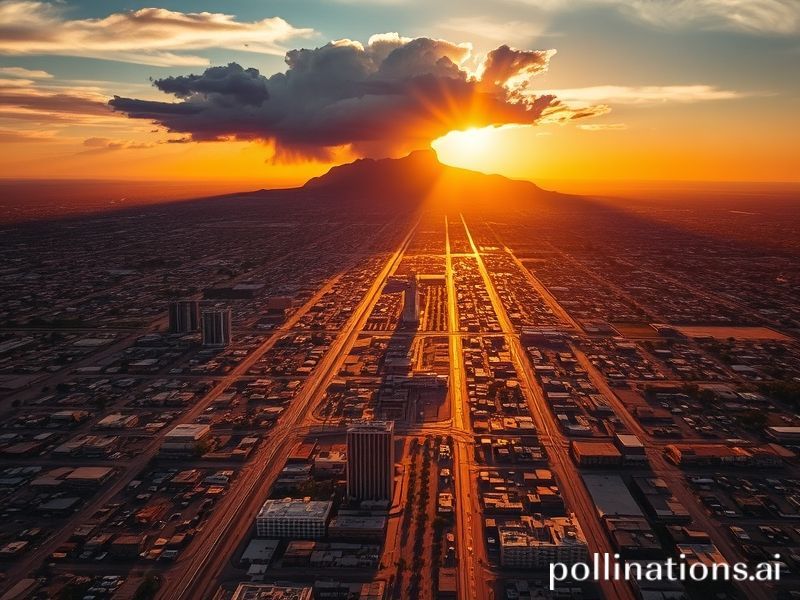Weather Phoenix: How One City’s Inferno Became the Planet’s New Travel Trend
Weather Phoenix: When the Sky Decides to Rebrand, the World Gets Burned
By the time the mercury in Phoenix hit 119°F (48°C) last week, the city had already exhausted the English language for “hot.” Locals were reduced to comparing the sidewalk to a George Foreman grill and describing their shoes as “flambé.” But the spectacle unfolding in the Sonoran Desert is more than a regional inconvenience; it is a dress-rehearsal for the planet’s next act, complete with rolling blackouts, melted streetlights, and the sort of existential heat warnings that read like Mayan prophecy.
From the air-conditioned comfort of Geneva, the World Meteorological Organization issued its usual boilerplate about “record-breaking extremes,” which is diplomatic code for “we told you so, but you were busy arguing on Twitter.” Meanwhile, in Delhi—where temperatures have flirted with 123°F (50°C) this summer—Phoenix’s plight feels almost quaint, like a postcard from a slightly warmer circle of hell. In Iraq, the government has declared more national holidays than working days just so people can stay home and not evaporate. Even the Siberian tundra is getting in on the act, releasing methane like a drunk uncle at Christmas.
The global takeaway is simple: if Phoenix is a phoenix, it’s rising from the ashes only to set everything else on fire. The city’s heat dome is an exportable commodity now, a franchise operation spreading its branding to Athens, Tokyo, and Buenos Aires. Climate scientists, who have spent decades perfecting the art of being ignored, point out that the jet stream—the planet’s air traffic controller—has started behaving like a pilot on his fifth martini. The result is weather that no longer respects passports: Canadian wildfire smoke touring Manhattan, Libyan storm Daniel dropping a year’s worth of rain in a day, and Antarctic sea ice deciding that “existence” is optional.
Back in Arizona, the coping mechanisms are equal parts ingenuity and desperation. The city has painted certain streets a shade of gray so reflective it could signal Mars, while air-conditioned buses now serve as mobile cooling shelters—essentially public transport for poultry. Tech bros in Scottsdale propose geo-engineered clouds, presumably delivered by subscription. Across the globe, poorer nations watch these innovations with the weary amusement of people who have been fanning themselves with cardboard since the 1990s. Bangladesh, already losing villages to the Bay of Bengal, can’t quite pivot to “reflective pavement chic.”
Economically, the heat is the new oil shock, minus the oil. European energy markets spike every time the sun overdoes it; Chinese lithium miners in Chile hydrate with sports drinks normally reserved for marathoners; and insurance companies from Munich to Mumbai are quietly canceling policies the way one might ghost a toxic ex. Even the Swiss, who have built an entire national identity on being pleasantly chilly, are now importing glacier blankets to keep their cash-cow mountains photogenic.
Meanwhile, diplomats continue to negotiate carbon cuts the way teenagers negotiate curfew: with elaborate eye-rolling and the quiet certainty that someone else will deal with the fallout. The next UN climate summit is scheduled for Baku, a city that sounds like an oven setting and is only marginally cooler. Delegates will no doubt spend the first three days arguing over the thermostat.
The broader significance, stripped of diplomatic niceties, is that Phoenix is simply the canary that burst into flames mid-song. Every city with asphalt, ambition, and a power grid is queued up for the same pyrotechnics. The choice now is between retrofitting civilization or perfecting the art of sweating elegantly. Either way, the world will need a new vocabulary for “hot,” preferably one that fits on a tombstone.
Conclusion: Until humanity decides to treat the atmosphere as anything other than an open sewer, Weather Phoenix will continue its world tour, selling out venues from Madrid to Manila. Pack sunscreen, skepticism, and perhaps a small, heat-resistant deity. The show, after all, is just getting started.







